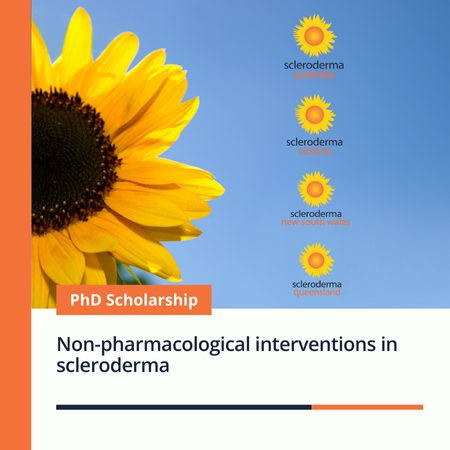
05 Mar PhD Scholarship Announcement – Non-pharmacological interventions in scleroderma
We are proud to announce a PhD scholarship that is supported by donations from Scleroderma Australia, Scleroderma Victoria, Scleroderma Queensland, and Scleroderma New South Wales. This scholarship is in memory of Carolle and Lita, two remarkable individuals who lost their lives to scleroderma. The Scholarship aims to fund a PhD candidate supervised by Professor Mandana Nikpour and Dr. Stephanie Frade at the University of Sydney, along with Prof Lainie Cameron at the University of Southern Queensland and Dr Ayano Kelly at the University of New South Wales. The research project aims to assess the effectiveness of non-pharmacological interventions in scleroderma and we welcome Christabell Elbitar as the recipient.
Let’s hear from Christabelle:
I am Christabelle Elbitar, a PhD candidate with a background in pharmacy and a strong interest in public health and education. I am doing my PhD at the School of Public Health at Sydney University, working under the guidance of Professor Mandana Nikpour (Rheumatologist, Public Health Professor at the University of Sydney, and Director of the Sydney MSK Research Flagship Centre), Associate Professor Danielle Muscat (Director of Research at the NSW Statewide Health Literacy Hub and Applied and Translational Research Lead at the Sydney Health Literacy Lab), Dr. Stephanie Frade (Exercise physiologist and Postdoctoral Researcher at the University of Sydney), Dr. Ayano Kelly (Director of Medical Education and Senior Lecturer at UNSW Medicine & Health and Honorary Medical Officer at Liverpool Hospital), and Professor Lainie Cameron (Discipline Leader – Sport and Exercise Science and Program Director – Clinical Exercise Physiology).
After finishing my Pharmacy degree and a Master’s in Pharmaceutical Business Administration from the Lebanese University in Beirut, I wanted to grow my career while experiencing other countries’ different and advanced health systems. In 2022, I moved to Australia to complete a Master of Public Health at Western Sydney University. During my studies, I gained strong knowledge in health education and promotion. In 2023, I was awarded the Dean’s Medal for my academic performance.
My PhD research focuses on health literacy (HL) in people with scleroderma. HL is about how people find, understand, and use health information to make choices that improve their health and well-being. I am very interested in HL because improving it can help people with chronic conditions like scleroderma better manage their health. Good HL is linked to better use of healthcare services, like knowing how to take prescribed medications, understanding the signs of the disease, and knowing when to go to the emergency room. When people understand their condition better, they can manage it more effectively, which leads to better health outcomes.
In my research, I aim to identify the main problems people with scleroderma face in understanding health information, such as complicated healthcare systems, poor communication with doctors, and language barriers. I will do this by interviewing people with scleroderma to better understand their experiences and the challenges they face. This will help me find ways to improve health education and care, like supporting multidisciplinary team care or promoting tailored education programs to help people with scleroderma manage their condition and improve their health and quality of life.
The experiences of people with scleroderma and how they find, understand, and use health information in their daily lives is the focus of the design of my first study. It will also look at how health literacy affects people with scleroderma to manage their condition. Participants will be recruited from different hospitals in NSW to ensure the study includes a wide range of people, making the results more useful for a larger group of people with scleroderma.
I am excited to work with a consumer advisory panel of people with scleroderma. This panel includes patients from different age groups and with different lengths of experience living with the condition who have volunteered to help guide the study plan. Their involvement ensures that the research reflects the real needs and challenges of people with scleroderma.
I look forward to sharing the results of this study, which I believe will show how improving health literacy can help people with scleroderma better manage their health and improve their lives.


